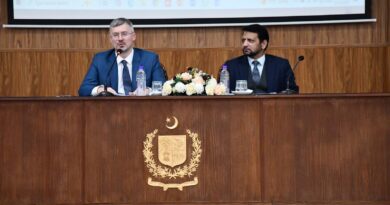SHADOWS IN THE MARKET OF PEACE
Dr. Muhammad Shahzad Ashfaq
Post-Doctorate (Peace Education)
International Islamic University Islamabad
In the global landscape, peace is a fundamental aspiration for societies worldwide. Achieving and maintaining peace is a complex process that involves multiple actors, institutions, and dynamics. Within the realm of peacebuilding and conflict resolution, the market of peace emerges as a significant arena where various stakeholders engage in activities aimed at promoting peace and preventing conflicts.
The market of peace encompasses a wide range of activities and initiatives aimed at addressing the root causes of conflicts, building consensus, and promoting peaceful coexistence. This market involves a diverse set of actors, including governments, international organizations and non-governmental organizations (NGOs) civil society groups, and private sector entities. Each stakeholder plays a unique role in contributing to peacebuilding efforts.
Governments are key players in the market of peace, as they have the authority and resources to implement policies and programs that promote peace and stability. For instance, governments can engage in diplomatic efforts to mediate conflicts, provide humanitarian assistance to communities affected by violence and support peacebuilding initiatives at the national and international levels. Additionally, governments can allocate funding for peacebuilding projects and leverage their political influence to facilitate peace negotiations and reconciliation processes.
Despite the noble intentions and efforts in the market of peace, there exist shadows hidden or overlooked aspects that pose challenges to the effectiveness and sustainability of peacebuilding initiatives. The shadows in the market of peace, exploring the underlying issues, implications and potential strategies to address them.
The market of peace encompasses a wide array of activities including diplomacy, mediation, peacekeeping, development aid and conflict resolution mechanisms. While these initiatives are essential for fostering peace several shadows lurk within the market of peace, hindering its effectiveness and impact.
One of the prominent shadows in the market of peace is the commodification of peacebuilding efforts. Peacebuilding has become a lucrative industry with various organizations, consultants and experts offering their services in conflict-affected regions. This commercialization of peace can lead to conflicts of interest, lack of accountability or prioritization of profit over genuine peacebuilding outcomes. As a result, peacebuilding efforts may become superficial, driven more by financial incentives than by a genuine commitment to sustainable peace.
Another shadow in the market of peace is the securitization of peacebuilding. In many conflict-affected regions peacebuilding efforts are heavily securitized with a focus on military interventions, counter-terrorism measures and the suppression of dissent. This securitization approach often neglects the root causes of conflicts, such as social injustice, economic inequality, and political disenfranchisement. Prioritizing security over comprehensive peacebuilding strategies this shadow disseminates cycles of violence and instability.
International organizations, such as the United Nations (UN), the European Union (EU), and the African Union (AU), also play a crucial role in the market of peace. These organizations provide a platform for dialogue, cooperation, and coordination among member states to address conflicts and promote peace and security. They deploy peacekeeping missions, facilitate peace talks, and support capacity-building efforts in conflict-affected regions. Moreover, international organizations develop norms, standards, and frameworks for conflict resolution, peacebuilding, and post-conflict reconstruction.
NGOs and civil society groups are vital actors in the market of peace, as they have grassroots connections and networks that enable them to mobilize communities, advocate for peace, and provide humanitarian assistance. These organizations engage in conflict prevention, peace education, and reconciliation activities that empower individuals and communities to resolve conflicts peacefully. NGOs and civil society groups often work in partnership with governments and international organizations to implement peacebuilding programs and initiatives.
Furthermore, the instrumental of peacebuilding by powerful actors is another shadow that undermines the process of stability in region. In some cases, powerful states or international organizations geopolitical interests, often at the expense of local ownership and inclusivity. This instrumental measures can lead to the imposition of peace agreements that do not address the underlying grievances of conflicting parties resulting in fragile and unsustainable peace processes.
The exclusion of marginalized voices and groups in peacebuilding processes is yet another shadow in the market of peace. Many peace initiatives are dominated by elites, political leaders, and international actors, marginalizing the perspectives or needs of women, youth and indigenous communities other vulnerable populations. This exclusion perpetuates inequalities, injustices, and grievances that fuel conflicts making sustainable peace elusive.
The shadows in the market of peace highlight the complexity and challenges inherent in peacebuilding and conflict resolution efforts. Addressing these shadows requires a concerted effort to promote transparency, accountability, inclusivity and a genuine commitment to peace at all levels of engagement. Recognizing and mitigating these shadows, stakeholders in the market of peace can enhance the effectiveness, legitimacy and sustainability of peacebuilding initiatives, ultimately contributing to a more peaceful and just world.



